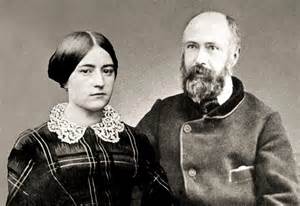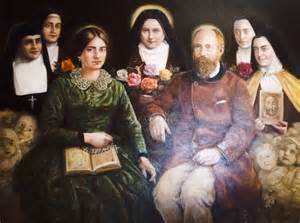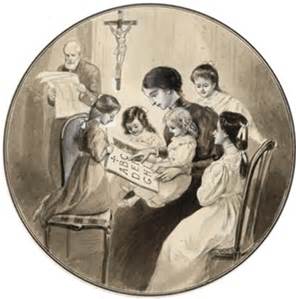
Companions on our Journey
by Maureen O’Riordan
 Although Zélie and Louis were constantly pressed for time, each was faithful to the contemplative life, the life of family prayer, and the liturgical life of the Church, and they created a family similarly faithful. Husband and wife maintained a demanding schedule. Yet every morning they attended the 5:30 Mass, saying it was the only one the poor and working persons could attend. When the neighbors heard their door shut as they left for church, they would say “Oh, it’s only that holy Martin couple going to church; we can turn over and sleep a while longer.” Every morning and evening they prayed as a family; they observed Sundays and the feasts of the Church with care. Louis was a leader in the nocturnal adoration of the Eucharist. Zélie, always the last to go to bed, was often up till nearly midnight. There were many demands on their time, but they gave it generously to serve God and their neighbor.
Although Zélie and Louis were constantly pressed for time, each was faithful to the contemplative life, the life of family prayer, and the liturgical life of the Church, and they created a family similarly faithful. Husband and wife maintained a demanding schedule. Yet every morning they attended the 5:30 Mass, saying it was the only one the poor and working persons could attend. When the neighbors heard their door shut as they left for church, they would say “Oh, it’s only that holy Martin couple going to church; we can turn over and sleep a while longer.” Every morning and evening they prayed as a family; they observed Sundays and the feasts of the Church with care. Louis was a leader in the nocturnal adoration of the Eucharist. Zélie, always the last to go to bed, was often up till nearly midnight. There were many demands on their time, but they gave it generously to serve God and their neighbor.
Louis and Zélie loved each other very much. In October 1863, away on business, Louis wrote to Zélie: “My dearest, I cannot get back to Alencon before Monday; the time seems long to me, for I want so much to be with you . . . . I embrace you all with my whole heart, while awaiting the joy of being with you again . . . . Your husband and true friend who loves you forever.”4 In August 1873, when Zélie took the little girls to Lisieux to see their relatives, she wrote to him: “I am with you all day in spirit, and say to myself: ‘Now he is  doing such and such a thing.’ I long to be with you, Louis dear. I love you with all my heart, and I feel my affection doubled by being deprived of your company. I could not live apart from you.”
doing such and such a thing.’ I long to be with you, Louis dear. I love you with all my heart, and I feel my affection doubled by being deprived of your company. I could not live apart from you.”
They also loved their children deeply. A few weeks before Thérèse’s birth, Zélie wrote to her sister-in-law: “I love children to the point of folly; I was born to have them. . . . But it will soon be time for all this to end . . . I’m at an age when I should be a grandmother!”5 On March 4, 1877, Zélie wrote to her daughter Pauline: “When we had our children, our ideas changed somewhat. From then on we lived only for them. They made all our happiness, and we would not have found it except in them. Nothing any longer cost us anything; the world was no longer a burden to us. As for me, my children were my great compensation, so that I wished to have many in order to bring them up for Heaven.”6 Zélie’s letters are filled with descriptions of good times at home, with chestnuts, cakes, and fritters for feasts; visits to relatives; and the girls’ pleasure over their New Year’s gifts.3
In the midst of this family life, however, the parents formed each daughter carefully from childhood in the spiritual life. They studied each child as an individual, nurtured her confidence in them, and encouraged her to give God a free hand in her life. About the decision to allow Marie to go on a retreat at the Visitation Convent where she had been educated, Zélie wrote, “I did have a good reason for wanting Marie to make the retreat. It’s true that it is an expense, but money is nothing when it comes to the sanctification of a soul; and, last year, Marie came back completely changed.”7 Louis had a profound respect for the spiritual lives of his daughters and reverently supported each in fulfilling her vocation.
 Devoted to each other and to their children, Zélie and Louis reached out lovingly to support their extended families. For years they shared a house with Louis’s parents. When Zélie’s father could not find a good housekeeper, she welcomed him gladly into her own home, and she wrote to her brother “You would not find one in a hundred as good as my husband is to a father-in-law.”8 When her father died, Zélie wrote to her sister-in-law: “If you only knew, my dear sister, how much I loved my father! He was always with me; I never left him; he gave me all the help he could.”9 The couple was very close to Zélie’s sister Marie-Louise, a nun of the Visitation at Caen, and sent their three oldest girls to school at her convent. They often wrote and visited Zélie’s brother, Isidore Guérin, and his wife, Céline, who lived at Lisieux. After Zélie’s death, Louis moved to Lisieux with his five daughters to give them the advantage of the influence of their aunt, uncle, and cousins.
Devoted to each other and to their children, Zélie and Louis reached out lovingly to support their extended families. For years they shared a house with Louis’s parents. When Zélie’s father could not find a good housekeeper, she welcomed him gladly into her own home, and she wrote to her brother “You would not find one in a hundred as good as my husband is to a father-in-law.”8 When her father died, Zélie wrote to her sister-in-law: “If you only knew, my dear sister, how much I loved my father! He was always with me; I never left him; he gave me all the help he could.”9 The couple was very close to Zélie’s sister Marie-Louise, a nun of the Visitation at Caen, and sent their three oldest girls to school at her convent. They often wrote and visited Zélie’s brother, Isidore Guérin, and his wife, Céline, who lived at Lisieux. After Zélie’s death, Louis moved to Lisieux with his five daughters to give them the advantage of the influence of their aunt, uncle, and cousins.
Maureen O’Riordan, a student of St. Thérèse, lives in Philadelphia, Pennsylvania. For many years she has spoken about St. Thérèse to parish, Carmelite, and retreat groups. She has published articles about St.Thérèse and her parents.
Listen to more of this fascinating interview with Maureen broadcasting on Magnificat Media/Radio, Thursday, January 19th @ 6am, 7am, 3pm, and 4pm, CST, USA.
Below are the links to her websites:
- Saints Louis and Zelie Martin, the Parents of Saint Therese of Lisieux
- Leonie Martin, Disciple and Sister of Saint Therese of Lisieux
- Saint Therese of Lisieux: A Gateway
Prayer to Saints Louis & Zelie Martin
